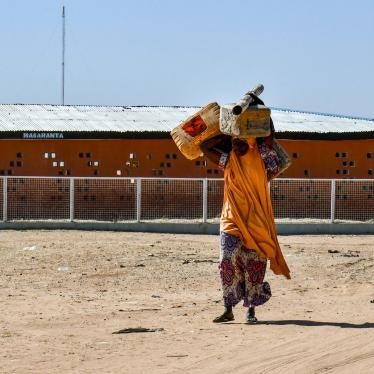In Mogadishu, civilians are trapped in a bloody conflict pitting the Transitional Federal Government (TFG), supported by the African Union Mission in Somalia (AMISOM), against an armed opposition spearheaded by the militant Islamist group al-Shabaab. Civilians in Mogadishu continue to bear the brunt of the fighting, which has long been characterized by indiscriminate attacks by all sides. In the past year, the majority of abuses reported have been attributed to non-state armed groups, including al-Shabaab and Hizbul Islam. But the TFG and AMISOM forces should do much more to ensure that they minimize harm to civilians. Opposition fighters have unlawfully deployed in densely populated civilian neighborhoods and at times used civilians as "shields" to fire mortars at TFG and AMISOM positions-attacks conducted so indiscriminately that they frequently destroy civilian homes but rarely strike military targets. Often AMISOM or TFG forces respond in kind, launching indiscriminate mortar strikes on the neighborhoods from which opposition fighters had fired and then fled-leaving only civilians to face the devastation that ensues.
Outside of Mogadishu, many areas of southern Somalia are under al-Shabaab control and have achieved a degree of stability. But this relative peace comes at a high cost for the local population, especially women. Al-Shabaab regularly metes out harsh punishments without due process, including amputations and floggings. People accused of being traitors or government sympathizers-often on flimsy pretexts -face execution or assassination. Opposition groups have killed civilians regularly and with complete impunity, sometimes simply because they lived in government-controlled areas of Mogadishu. Women particularly suffer from Al-Shabaab's brutal attempts to enforce their edicts. Many local al-Shabaab authorities devote extraordinary energy to policing the personal lives of women and preventing any mingling of the sexes.
All warring parties, including TFG and AMISOM, should issue clear public orders and take all necessary steps to ensure their compliance with international humanitarian and human rights law, and cease all use of mortar in populated areas unless measures are implemented to ensure the compliance with the principles of distinction and proportionality. Violations should be promptly, impartially and transparently investigated, those responsible should be held to account, and victims should be meaningfully compensated for loss of life, injury or property damage.
Addressing impunity should also be a top priority. An independent and impartial commission of inquiry should be established to investigate and document serious crimes and recommend measures to improve accountability. This is crucial both as a potential deterrent to further violence as well as a critical step towards laying the groundwork for future justice and accountability.
Finally, increasing awareness of the human rights situation in Somalia should be an urgent priority in order to better define strategies to protect human rights and prevent future violations. OHCHR should strengthen its capacity to monitor and publicly report on the human rights situation in Somalia, including by increasing its staff capacity to document abuses through interviewing displaced persons in Somalia as well as refugees in neighboring countries.







